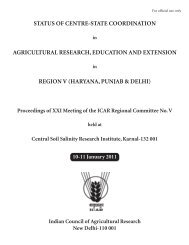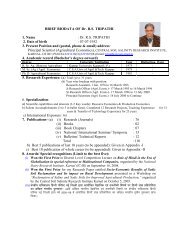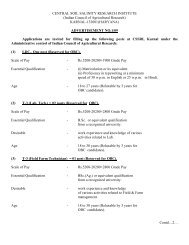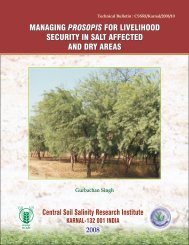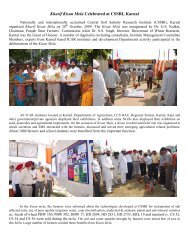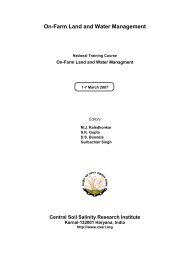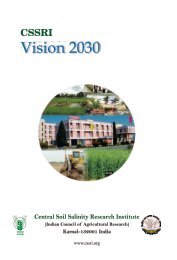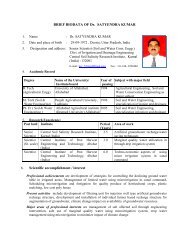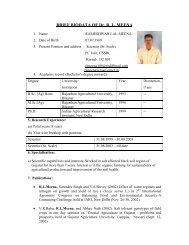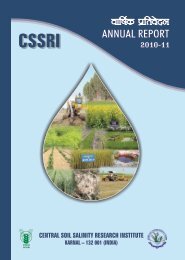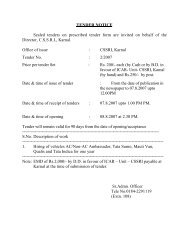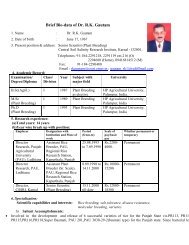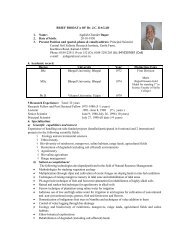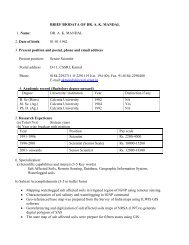BIOSAFOR - BIOSALINE (AGRO) FORESTRY - Central Soil Salinity ...
BIOSAFOR - BIOSALINE (AGRO) FORESTRY - Central Soil Salinity ...
BIOSAFOR - BIOSALINE (AGRO) FORESTRY - Central Soil Salinity ...
Create successful ePaper yourself
Turn your PDF publications into a flip-book with our unique Google optimized e-Paper software.
Biosaline biomass could contribute to a sustainable biofuel supply of developing countries and of the<br />
European Union (EU). For the EU this is true as well for biomass produced on European sites (e.g. in Spain) as<br />
for biomass that will be imported from other than EU countries. Objective of this work package is to elaborate<br />
recommendations for the implementation and sustainable performance of biosaline biomass systems and to<br />
show how policy measures can support a sustainable biomass supply from biosaline biomass production.<br />
Description of work<br />
Based on the information gained mainly from WP2, WP4 and WP5 and in joint discussion with the whole<br />
project group recommendations will be elaborated on:<br />
• the optimal choice of saline areas for biomass production<br />
• the optimal performance of biosaline agrosystems in terms of choice of species and varieties and<br />
production technology<br />
• the optimal biosaline biomass systems with regard to economic and environmental performance<br />
• implementation of sustainable biosaline biofuel supply and trade chains<br />
• policy measures that can support the implementation of sustainable biomass supply from biosaline<br />
biomass production workshops to inform the local stakeholders of biosaline biomass chains and EU<br />
politicians will be performed by the DEV participants. A final workshop to present project results was<br />
held in New Delhi in April 2010.<br />
Deliverables<br />
Identification of the overall constraints for the implementation and sustainable performance of biosaline<br />
biomass systems<br />
Analysis of - and recommendations on - policy measures to support a sustainable biomass supply from<br />
biosaline biomass production<br />
Background documents to be presented at the workshops on biosaline biomass in DEV countries<br />
Policy briefs and dissemination materials for the workshop on biosaline biomass in Brussels<br />
Research Achievements Overall<br />
Regression curves relating harvested biomass, girth and plant height were developed and validated. A<br />
database was established in MS Access to link the different subsets of field data and be able to assess and<br />
evaluate case study data. The work carried out by CSSRI was highly appreciated. They were able to provide<br />
very useful data to establish relationship between growth and biomass of the test species based on real longterm<br />
data on plantations on saline and sodic lands.<br />
Studies at the case study sites having plantations on saline and sodic lands - eight in India, five in Pakistan<br />
and two in Bangladesh were conducted and /or monitored providing very useful data to establish<br />
relationship between growth and biomass of the test species based on real long-term data on plantations on<br />
saline and sodic lands.<br />
— Regression equations for biomass calculation of trees based on actual harvested total biomass (kg/tree),<br />
girth at breast height (cm) and total height (m) were developed to predict biomass in similar situations<br />
and age of the plants<br />
— These equations and data have been used to make non-destructive projections at regional and global<br />
levels for similar saline and sodic lands<br />
Hydrological data available at regional and local scale in case study areas including India, Pakistan and<br />
Bangladesh were collected and reviewed. A GIS analysis was performed to find potential areas requiring<br />
25



